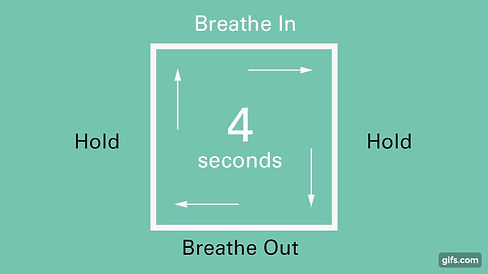Vagal Activation:
Harnessing the Science of Calm
At Untangled Mind LLC, we believe that healing isn't just about what you think—it’s about how your nervous system responds to the world around you. If you’ve ever felt stuck in stress, caught in cycles of anxiety, or unable to fully relax, it’s not just in your mind—it’s in your body’s physiological wiring.
The vagus nerve plays a critical role in your ability to regulate emotions, recover from stress, and foster a sense of safety. This nerve acts as a bridge between your brain and body, influencing everything from your heart rate and digestion to your emotional resilience. When properly engaged, it helps shift your body out of a fight-or-flight state and into one of calm, clarity, and connection.
As a certified neuropsychotherapist, I integrate evidence-based techniques that target the nervous system’s role in mental health. Traditional talk therapy alone doesn’t always help when your body is wired for survival over stability. By incorporating vagal activation practices, we work directly with your body's built-in pathways for regulation, helping you move from chronic stress to a state of balance and control.
This page offers a selection of practical, research-backed techniques that can help you strengthen your vagal tone, improve emotional flexibility, and build greater resilience against stress.
Vagal Activation
Welcome! Here, you’ll find a selection of vagal activation techniques designed to help regulate stress and support recovery from traumatic experiences.
These exercises are intended to promote balance within the nervous system, fostering a sense of calm, resilience, and emotional stability.
Please note: These practices are for personal use and should be done at your own discretion.

The Role of the Vagus Nerve in Stress & Healing
The vagus nerve plays a critical role in your body’s ability to regulate stress, recover from trauma, and maintain overall well-being. It is one of the largest and most influential nerves in the body, extending from the brainstem through the neck and into the abdomen. This nerve is responsible for regulating key functions such as digestion, heart rate, immune response, and emotional regulation.
How the Vagus Nerve Impacts Your Body
When you experience stress, your body activates the sympathetic nervous system—better known as the “fight or flight” response. This triggers physical reactions such as rapid heartbeat, shallow breathing, and heightened alertness. The vagus nerve, as part of the parasympathetic nervous system, works to counteract this response, allowing the body to return to a state of balance, relaxation, and recovery.
However, when vagal tone is weak or dysregulated, the body may struggle to shift out of high-alert mode, leading to chronic stress and a cascade of physical and emotional challenges, including:
-
Digestive Issues: The vagus nerve regulates digestion and metabolism. Poor vagal tone can contribute to bloating, indigestion, constipation, and impaired nutrient absorption.
-
Cardiovascular Effects: It plays a key role in heart rate variability and blood pressure regulation. Weak vagal tone can lead to heart palpitations, high blood pressure, and increased cardiovascular strain.
-
Respiratory Dysregulation: While not directly controlling breathing, the vagus nerve influences breath rate by regulating the nervous system’s response to stress and anxiety.
-
Immune System Dysregulation: The vagus nerve has anti-inflammatory properties. When vagal function is low, inflammation can persist, leading to immune system overactivation and potential autoimmune issues.
-
Endocrine Imbalances: The vagus nerve helps regulate cortisol levels and other hormones. Chronic stress and low vagal tone can disrupt sleep, metabolism, and overall hormonal balance.
Why Vagal Activation Matters
Many of these imbalances are linked to chronic stress, anxiety, and trauma, which keep the nervous system stuck in a reactive state. This prevents the vagus nerve from doing its job—restoring calm and stability to both the mind and body.
At Untangled Mind LLC, I incorporate neuropsychotherapy and vagal activation techniques to help regulate your nervous system, enhancing your ability to manage stress, process emotions, and build long-term resilience. By stimulating the vagus nerve, these methods support the body’s natural ability to shift out of stress mode, leading to improved emotional well-being and physiological health.
With regular practice, vagal activation can enhance self-regulation, increase emotional flexibility, and support long-term nervous system resilience.
Try These Resources Below
The vagus nerve is a powerful tool for healing—but like any skill, regulation and resilience take practice. Below, you’ll find guided exercises designed to help you activate your vagus nerve and build a stronger stress response system.
If you’re ready to go deeper and learn how to truly integrate these practices into your healing journey, explore our Untangling Trauma Workbook—part of the Untangling Series. This workbook is designed to help you:
✔ Understand the science of trauma and nervous system regulation
✔ Apply vagal activation techniques in a structured, therapeutic way
✔ Build emotional flexibility and self-regulation skills for lasting change
This is one of three Untangling Series Workbooks, each crafted with a data-driven, therapeutic approach to help you achieve true and lasting transformation.
Ready to take the next step?
Purchase Untangling Trauma and start your journey toward real, measurable healing.
Box Breathing
Engage in box breathing, a simple yet powerful technique that encourages deep, controlled breaths to calm your nervous system, reduce stress, and restore balance.

Untangled Flow: Activating Your Nervous System for Healing
Grounding
Listen to the sensory grounding exercise.
